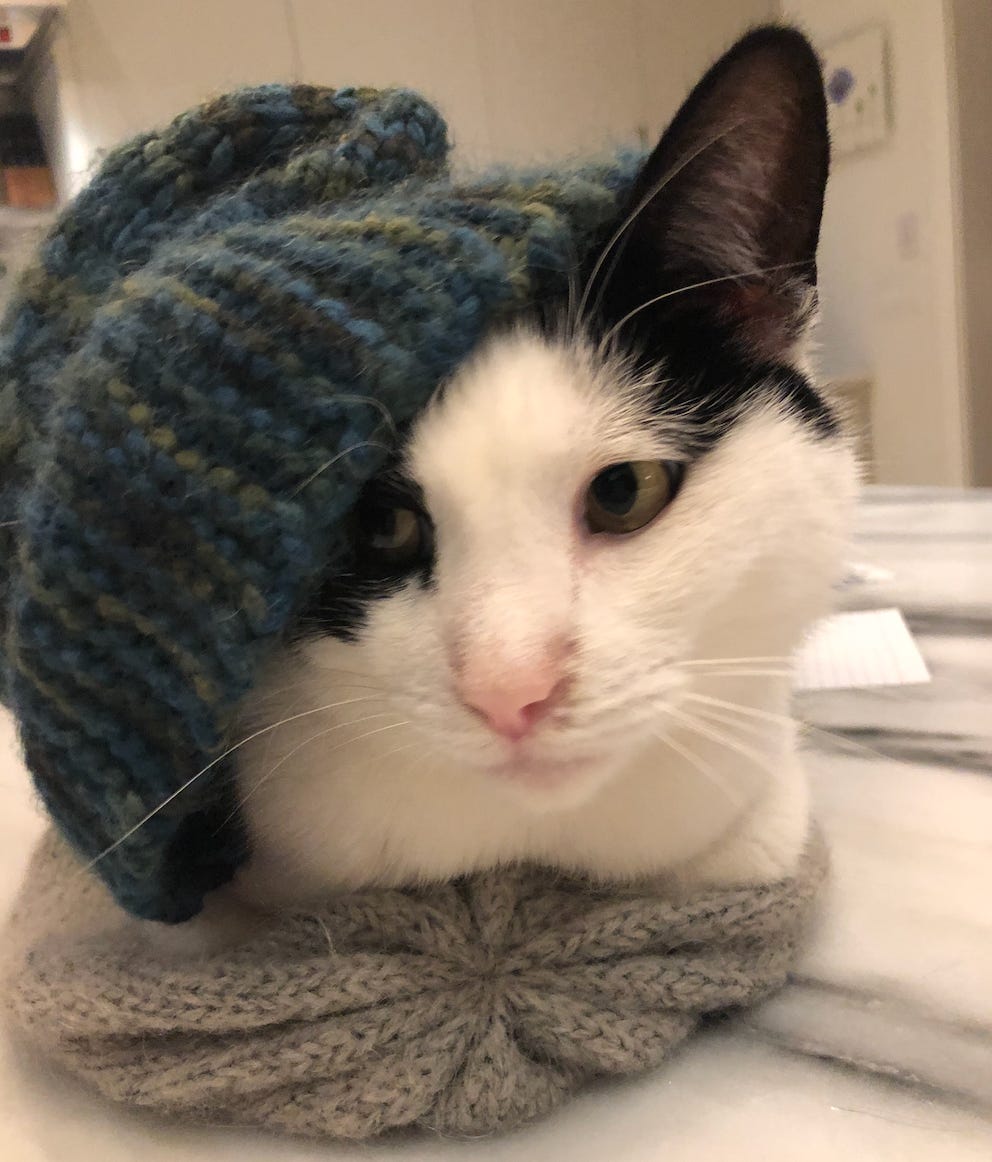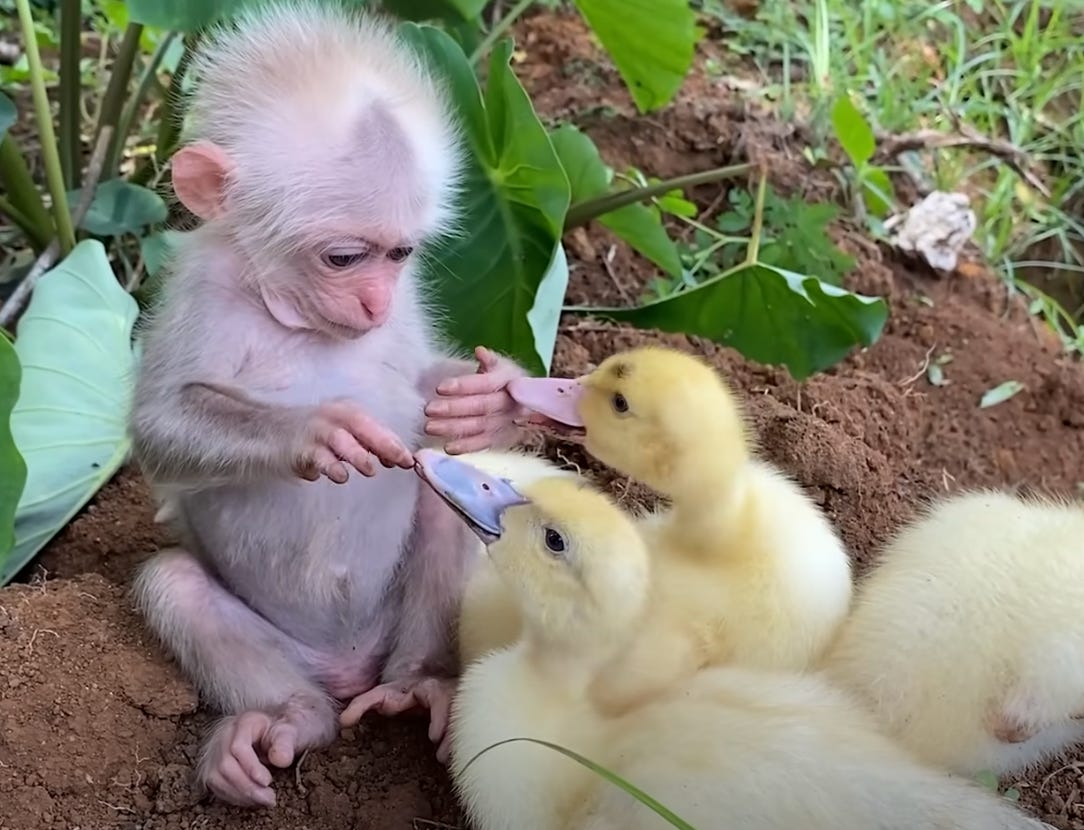Animals: what the hell?
Why do we invite members of entirely different species to share their lives with us?
Do any other pet owners occasionally stop and contemplate the strange fact that they’ve invited an animal or, in my case, several animals into our homes? Why do we do this? My pets are useless for personal protection. We don’t hunt. Nobody in my family is blind. We keep these creatures around for no practical purpose at all. We’re just like, “Hey member of a different species, would you like to live with me for the remainder of your life in exchange for free room and board? Yeah, you can just hang out in my house even when I’m not there.” That’s strange, right?
In my case, we’ve got two dogs and a cat, plus we maintain a very active bird feeder outside our kitchen window, so we’re also responsible for the birds and squirrels that spend all day bickering over sunflower seeds and corn kernels we provide free of charge. Lest you think it’s no big deal, those birds eat a lot of seed and birdseed ain’t free. Why the hell do we do this?
Interspecies friendships are possible but unlikely. Yes, we’ve all seen videos of ducks hanging out with monkeys or whatever, but humans seem to be the only species that regularly invites animals into their lives who give them nothing in return besides companionship. Which says a lot, I guess, about the human need for companionship.
In fact, a lot of people say they prefer their animals to other humans, which sounds sort of sweet until you consider the possibility that the most likely reason they prefer the company of animals to humans is because of their inability to get along with other humans. There’s a certain narcissism about preferring the company of creatures who are utterly reliant on you for their survival. Even so, we all understand the appeal of sharing our lives with beings unable to make critical comments about our new haircut.
I’m going to get woo-woo for a second, though, because I think there’s something deeper going on between species, and I don’t think it’s limited to our own. I suspect there’s some kind of consciousness-to-consciousness transference that happens between all creatures, and I wonder if the reason humans, in particular, crave the company of animals is because those sorts of pure exchanges happen less frequently between people because we’ve gotten so good at erecting protective barriers between us, including the barrier of language.
Language is a double-edged sword. There’s obviously never been a better tool for communication, but there’s also never been a better tool for guile. Language obfuscates as much as it delineates. Because animals, for the most part, lack this tool, their communication tends to be more straightforward. They’ll always tell you what’s up if you pay attention. For example, when a kangaroo stands up straight, puffs out its chest and looks like it’s getting ready to punch you in the face, chances are that kangaroo is standing up straight and puffing out its chest for the purpose of getting ready to punch you in the face.
Animals reward kindness, loyalty, generosity, and tenderness. They express gratitude and love. They tend to avoid small talk, although they don’t seem to mind listening to us with infinite patience when we talk to them. Our domesticated animals are always happy to see us and rarely complain about very much unless, like my cat, they would like the perfectly clean water to be changed and they would like that to happen toot suite, thank you very much.
The consciousness transference that I’m talking about is a subtle thing, a sense of connection we experience with other creatures with whom we have no direct way of communicating. I don’t know how to describe it other than as a non-verbal language whose only message seems to be, “You and me, kid. You and me.”
Every animal I’ve ever spent any time around seems to have this consciousness piece. Maybe that’s just anthropomorphism (yes, I had to look up the spelling) on my part, but I don’t think so. In fact, I think the opposite is at play: we’ve privileged human consciousness over all others because we like to think our bigger brains have given us some kind of special relationship to the natural order when, I suspect, our bigger brains have actually made us significantly dumber regarding the complex interplays that happen within the “natural” world. The purpose our animal companions provide is bridging the gap between humans and a higher world we’ve done everything in our power to eradicate.
I’m using the word “higher” here to describe an order of complexity that we have failed, to this point, to understand or even appreciate. Everything we’ve achieved as a species has been done to make the world safer and more explicable. In doing so, we’ve managed to pretty effectively segregate ourselves from that world. Which makes a certain amount of sense because that world, more often than not, is trying to kill us. But that world is also our source. No matter how much we try to lengthen the distance between us and it, the task is fruitless. In studying the world, we’ve managed to project ourselves to the most distant points in the universe but also boxed ourselves into ever-smaller modes of awareness about what’s going on around us. Animals are the way we ground ourselves. They’re like putting a fur coat on meditation.
As I type this, my cat, Alfalfa, is curled up, half-asleep, on the chair next to mine. He was never a very affectionate cat, but over the years he’s mellowed into an old softy. He’s about eleven, and it took him years to want to hang out by my side. Now we nap together every afternoon and, every now and then, he asks for pets. At night, he likes to prowl the area right outside our home. His attention is focused on little more than his own comfort and enjoyment, which is not so different from where I choose to place most of my own attention. Both of us are lazy. Both of us like treats before bed. Sometimes we just hang out and look at each other. I don’t know what he sees when he sees me, but I can tell you what I see what I look at him – the universe. And hairballs. If I’m being honest, mostly hairballs.




"Do any other pet owners occasionally stop and contemplate the strange fact that they’ve invited an animal or, in my case, several animals into our homes? Why do we do this?"
I'm a veterinarian and the sheer surreality of my chosen profession never ceases to amaze me. I've spent decades honing my ability to provide medical care to these weird, furry creatures that try to steal my own people food, and I wouldn't trade it for anything.
“If having a soul means being able to feel love and loyalty and gratitude, then animals are better off than a lot of humans." (James Herriot, All Creatures Great and Small)